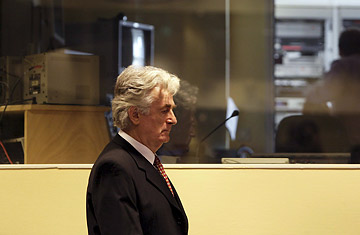
Radovan Karadzic at The Hague.
Former Bosnian Serb leader Radovan Karadzic appeared before judges at the Yugoslav war crimes Tribunal and refused to plead to the 11 charges against him, just as he had four weeks ago in his first appearance at the Hague court.
"I'm deeply convinced this court is representing itself falsely as a court of the international community, when it is in fact a court of NATO whose aim is to liquidate me," said Karadzic, dressed in a dark suit, red tie and reading glasses, and with a calm, confident and even humorous air. "I have stopped using a false name and I think all parties should do the same."
Karadzic, who is representing himself, said he has doubts that his trial can go on at all given what he calls its "errors." Judge Iain Bonomy assured him his concerns — all filed to the court and made public — will be addressed. Friday, though, the judge was interested only in Karadzic's pleas. When Karadzic refused to enter them, Judge Bonomy — bound by the rules of the court — did it for him: not guilty on all 11 counts. "In other words," clarified Judge Bonomy, "your plea is one of not guilty to the indictment as a whole."
"May I hold you to your word?" asked Karadzic.
"Which word?" replied the judge.
"That I'm not guilty."
"We shall see in due course," said Bonomy.
The former president may have tried humor with the unimpressed Scottish judge, but the charges against him are as serious as they get: genocide, persecution and extermination for being what prosecutors call the "mastermind" behind a large-scale ethnic cleansing campaign to expel non-Serbs from huge parts of Bosnia during the war in the early 1990s. He is charged with setting up notoriously brutal detention camps like Omarska, the 44-month siege of Sarajevo, and the 1995 Srebrenica massacre, when some 8,000 Muslim men and boys were executed over the course of five days. As Supreme Commander, say prosecutors, Karadzic was responsible for planning and ordering, aiding or abetting the crimes that went on under his leadership, and for failing to prevent them or punish anyone afterwards.
Karadzic is not the man today he was then; he's thinner than in the old days, and a far cry from the New Age guru Dragan Dabic, the identity he had assumed before being arrested by Serbian authorities in a Belgrade suburb last month. He's already filed a number of complaints to judges, challenging everything from the way he was arrested to the language of the court documents he receives. He says there's no way he'll get a fair trial given the "lynch atmosphere" in the media. He wants his case dismissed. He's also asked judges to order former Balkans envoy Richard Holbrooke to The Hague to testify about an alleged deal he says the diplomat made with him: immunity from prosecution in return for leaving public life. Holbrooke denies there was ever such a deal. And Tribunal prosecutors say in the remote chance there was, it's "legally irrelevant," that the US has no power to broker a deal on behalf of this court and that the 1995 Dayton Accord that ended the war specifically rules out any kind of immunity.
Prosecutors say they will have a new indictment ready at the end of next month, one amended to include new jurisprudence and evidence since their last indictment against Karadzic was drawn up eight years ago. But a displeased Judge Bonomy told prosecutors he was surprised they haven't already done their work.
"Everyone was wondering what the prosecutors were doing all these years," says Elsana Nurkovic, who follows the Tribunal for Belgrade's Humanitarian Law Center. "To me, honestly, this shows the prosecution never believed that Karadzic would come to the Tribunal one day."
Karadzic's radical rejection of the court's legitimacy echoes that of his one-time ally, former Yugoslav President Slobodan Milosevic, who died in 2006 before his four-year trial could produce a verdict. But there are important differences between the two men. For one, Karadzic is healthy, so the numerous delays and light court schedule that plagued Milosevic's trial shouldn't apply. While Karadzic also defies the court, he's far less aggressive than Milosevic. And more respectful. He stands when the judges enter the court; he wears his translation headphones, something Milosevic never deigned to do. Although his insistence on representing himself is hardly original, the way he expressed it to judges in just one of his growing list of complaints is distinctly, and tellingly, his own. "I will defend myself here as I would from a natural catastrophe," he wrote, "whose right to interfere with me I also dispute."
